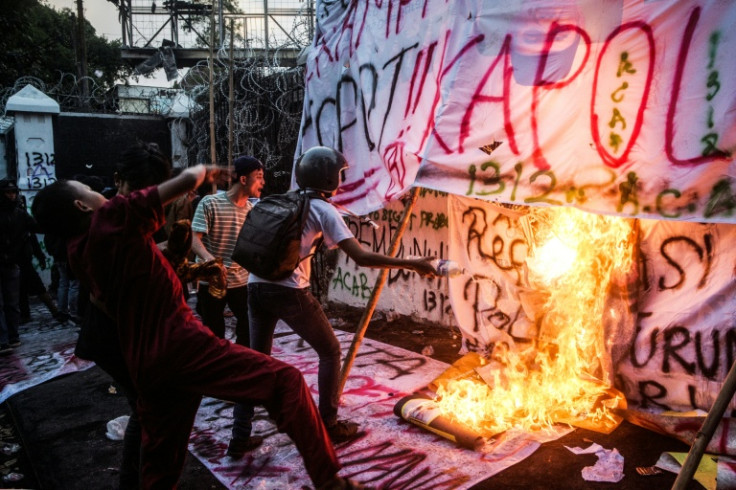Govt Gestures Leave Roots Of Indonesia Protests Intact

Government gestures to calm deadly protests in Indonesia have done little to address the economic inequality and hardship fuelling the unrest, leaving deep resentment to linger and flare up again, experts say.
The country's worst violence in decades left at least six people dead and 20 missing, with rallies over lavish perks for lawmakers descending into angry riots against police after officers were filmed running over a young delivery driver.
Southeast Asia's biggest economy recorded a surge in growth in the second quarter of the year on the back of manufacturing and export demand, which President Prabowo Subianto hailed, but everyday Indonesians are not seeing the data reflected in their wallets.
Instead they view a corrupt political class enriching itself and failing to listen to the public, while inequality grows between the rich and the poor, experts said.
"This is caused by economic issues. Some economic policies left the public quite annoyed or even angry," said Nailul Huda, economist at the Center of Economics and Law Studies (CELIOS).
"If economic growth is true, it will be felt by the lower-class society. Terminations are everywhere, and layoffs have increased up to 30 percent, which is quite high," he added.
Lavish benefits for lawmakers including a $3,000 housing allowance, which is nearly 10 times the minimum wage in the capital Jakarta, stirred the initial anger in protests last week before the driver's death.
The protests made Prabowo and parliament leaders U-turn and offer to revoke some perks, including issuing a moratorium on overseas visits.
But their moves have likely not gone far enough to address the underlying grievances of the wider public.
"The government appears insensitive to these concerns," said Nailul. "This has become the root of the administration's problems over the past four days."
Rising anger against the elite has manifested itself in looting, including the homes of several politicians.
It has not been confined to capital Jakarta either, with local and provincial council buildings set on fire or attacked with rocks and Molotov cocktails in cities across the country.
Prabowo had already faced smaller protests in February over widespread budget cuts to fund populist policies, including a billion-dollar free meal programme and new sovereign wealth fund Danantara.
"The budgets that were supposed to be utilised by other sectors are being diverted to popular programmes which most likely still have many problems," said Jahen Fachrul Rezki, an economic researcher at the University of Indonesia.
Around 42,000 people were also laid off between January and June, a 32 percent rise on last year, according to the Ministry of Manpower.
"It might be true that our economy is expanding, but who's benefiting from the growth? Probably just capital owners," Jahen said.
A cost-of-living crisis is being felt by many as the country struggles with a shrinking middle class and slower income growth compared to rising prices because of inflation, according to Jahen.
"The government claimed that we have an increase of rice supply, but it is not reflected in the price," he said.
According to Statistics Indonesia on Monday, the price of the staple good increased by more than six percent on last year.
The number of people living below the poverty line in metropolitan Jakarta -- a megalopolis of around 11 million people -- was up from 362,000 in 2019 to 449,000 as of September 2024, government data says.
"The government initially promised during the campaign that there would be job opportunities, education, and no more layoffs," said Nailul. "But the government fails to deliver."
One of Prabowo's early moves was to announce Indonesia would hike its value-added tax to 12 percent, before reversing after a backlash and saying it would only apply to luxury goods.
"It is neither feasible nor wise for the government to raise VAT rates when people's purchasing power is declining," said Nailul.
The death of the delivery driver, Affan Kurniawan, also stoked anger because workers like him have faced bigger pay deductions and longer working hours due to the economic situation.
Such conditions mean many Indonesians will still feel the economic pain in the coming months, leaving the door open for fresh protests.
"The protests on the streets probably will come down in the next few days, but it's just a matter of time until public anger resurfaces again," said Ray Rangkuti, political analyst at think tank Lingkar Madani.
"Because we're not addressing the issues, we're just covering them up," Rangkuti added.
© Copyright AFP 2025. All rights reserved.





















